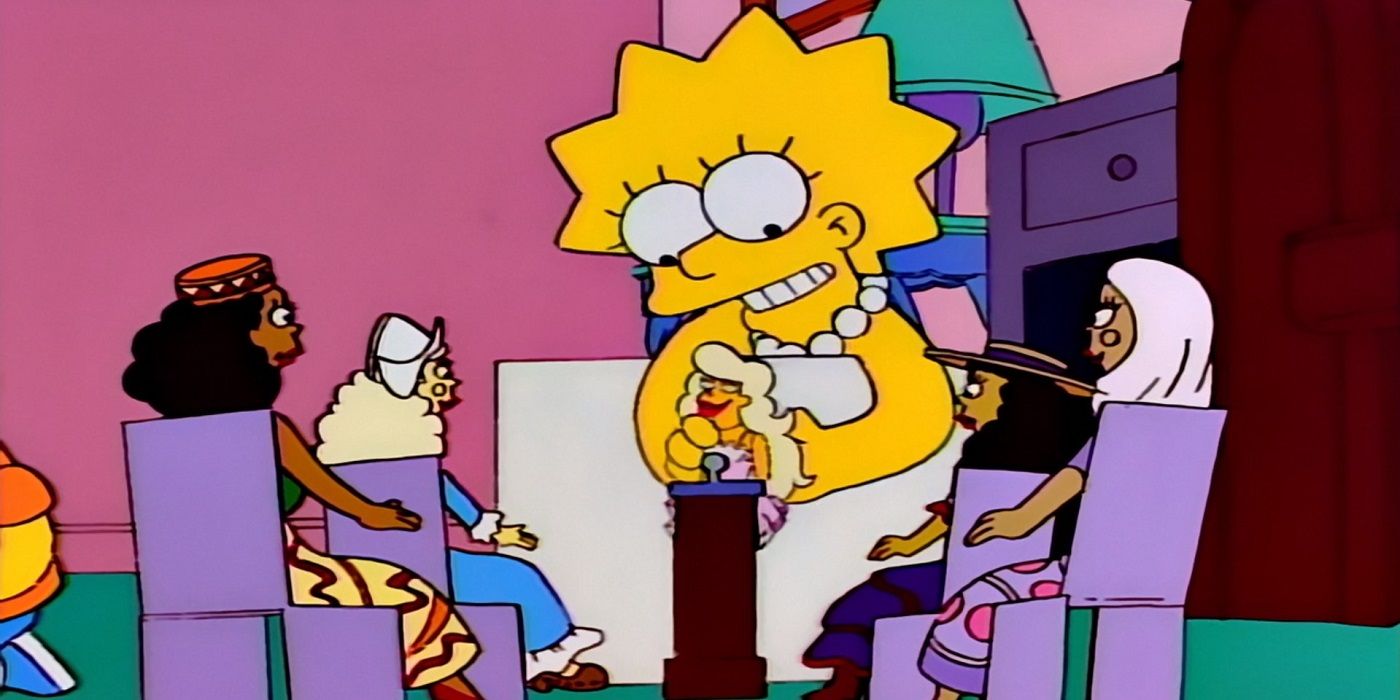The new trailer for Barbie has launched a wave of excitement for the upcoming film. Its sharp satire of the Dawn of Man sequence from 2001: A Space Odyssey speaks volumes about the filmmakers' approach to some surprisingly challenging material. The titular doll line is iconic but comes with some loaded baggage: including gender stereotyping and patriarchal notions of feminine beauty. The Barbie trailer responds by noting some of the glass ceilings the doll broke, moving beyond the omnipresent baby models to tell little girls they could be something other than mothers. Coupled with its fresh, self-effacing energy and the credentials of director Greta Gerwig and star Margot Robbie, it promises oodles of affectionate fun without whitewashing the character's complicated gender identity.
As with so many things, however, The Simpsons found a way to cover the territory first. Season 5, Episode 14, "Lisa vs. Malibu Stacy," sets the clan's activist middle child against the inherent sexism of her favorite toy. It draws on real-life Barbie-based controversy for its humor, demonstrating both the challenges faced by the new Barbie movie and the best way to overcome them.
The Simpsons Had Lisa Taking on the Sexism of Her Favorite Doll
Malibu Stacy is The Simpsons' version of Barbie, a 12-inch plastic doll -- complete with extensive playsets and accessories -- which every one of the girls on the show seems to have in their collection. She plays a passive role in Lisa's life before "Lisa vs. Malibu Stacy," often in the form of moral conundrums. For instance, Season 3, Episode 14, "Lisa the Greek," features Homer buying Lisa a bevy of expensive Malibu Stacy toys after she helps him win at sports betting. When she realizes her father has been exploiting her for money, she gives the new toys away and moves her doll back into its original homemade shoebox apartment.
Then Barbie suddenly became a target in the real world. In 1992, Mattel released "Teen Talk Barbie," which contained a voice box repeating hundreds of phrases in a chipper voice. They included things like "Math class is tough" and "Let's plan our dream wedding," which immediately drew ire from women's rights groups. Mattel apologized, but the story grew legs and got weirder. A 2018 article in Mental Floss recounts how a group of pranksters called The Barbie Liberation Organization swapped Teen Talk Barbie's voice box with similar boxes in talking G.I. Joe toys. The results had G.I. Joe's Duke saying things like "Will we ever have enough clothes?" while the Teen Talk Barbies screamed, "Eat lead Cobra!"
Needless to say, it was all too much for The Simpsons to resist. "Lisa vs. Malibu Stacy" was the result, as Lisa buys a talking Malibu Stacy doll only to hear it spouting absurdly sexist phrases like "Let's bake some cookies for the boys." When her complaints to the toy company are ignored, she seeks out Malibu Stacy's creator, Stacy Lovell. They create a new doll, Lisa Lionheart, which encourages young girls to believe in themselves and follow their dreams. The toy company responds with an "all-new" Malibu Stacy -- which is just the same old Malibu Stacy in a new hat -- and the new doll is forgotten. Lisa takes heart when one lone girl finds a Lisa Lionheart doll and takes it home with her.
Barbie Should Adopt the Same Approach
"Lisa vs. Malibu Stacy" remains one of the high points of The Simpsons' classic era. It throws massive shade on the doll's more problematic aspects but also keeps a sense of nostalgic fun. Stacy Lovell embodies a grown-up version of children's make-believe games, for instance, enduring a series of marriages to similar stand-ins for real dolls and living in a pink mansion reminiscent of "Malibu Stacy's Dream House." Lisa retains her love for the toy itself -- which reappears in numerous subsequent episodes -- without ignoring its sexist side and still uses Stacy to express feelings of confidence and empowerment.
Barbie presumably has the same goals in mind, along with the right creative forces to make it happen. It will also need to navigate the same controversies in similar fashion (the Teen Talk Barbie incident wasn't the only one in the doll's history). The trailer suggests that the creatives know exactly what they're doing, giving fans many reasons to hope for great things from the film itself. "Lisa vs. Malibu Stacy" pointed the way, however, and the new movie can't go far wrong by following its example.
The Barbie movie opens in theaters on July 21, 2023.


